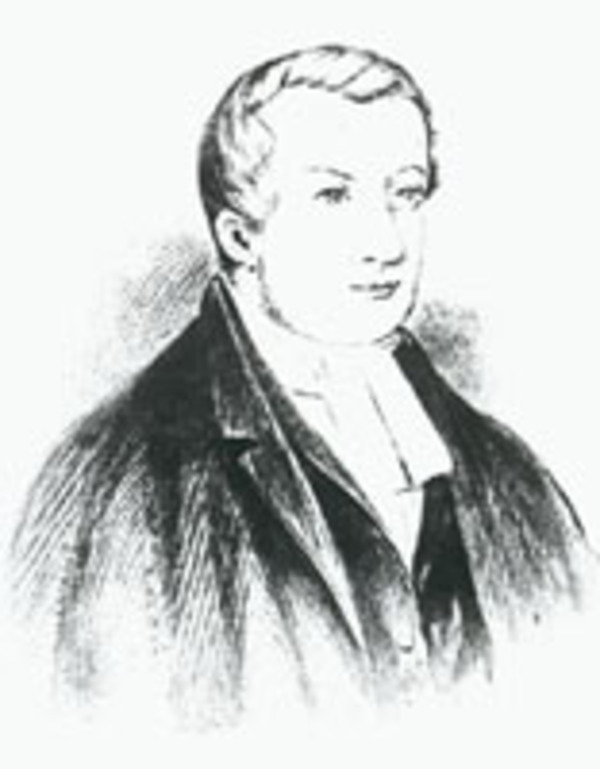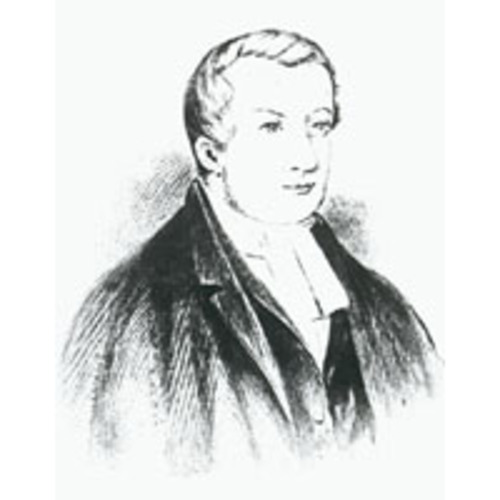
Source: Link
FRASER, DONALD ALLAN, Presbyterian minister and office holder; b. 24 Nov. 1793 in the parish of Torosay, Isle of Mull, Scotland, fifth and youngest child of Alexander Fraser and Isabella Maclean; m. 3 Oct. 1814 in Crossapol, Isle of Coll, Catherine Isabella Maclean, eldest daughter of the laird of Coll, and they had ten sons and one daughter; d. 7 Feb. 1845 in St John’s.
Donald Allan Fraser, son of a minister of the Church of Scotland, was educated at the Royal High School, Edinburgh, and began study for the ministry at the age of 13 when he entered the University of Edinburgh. Following graduation he was licensed to preach on 14 Dec. 1813 by the Presbytery of Mull and was ordained on 27 March of the following year.
After brief periods as a minister on Mull, in London, and in Tain, Scotland, Fraser responded to the petition for a Gaelic-speaking minister from the Highland settlers of Pictou County, N.S. In 1817 he settled at McLellans Mountain, organizing the first Church of Scotland congregation in Pictou County. A frame church, the earliest to be built in Nova Scotia specifically for the Kirk, was erected about 1818 and served 40 families. In 1819 a church was built for a second congregation of 25 families at Frasers Mountain, six miles distant. This structure was later moved to a site at New Glasgow. Besides supplying Blue Mountain and Albion Mines (Stellarton), Fraser travelled extensively throughout the county, his fluency in Gaelic being an important asset. He undertook missionary tours to Cape Breton, Prince Edward Island, and New Brunswick but, apart from a one-year ministry at Saint John, N.B., in 1826, he remained based at McLellans Mountain, supplementing his income from his 100-acre farm, Torosay.
Fraser did not join the newly formed Presbyterian Synod of Nova Scotia in 1817, but six years later he served as the first moderator of the Church of Scotland Presbytery of Pictou. Regarded by 1833 as the “senior clergyman,” he was chosen first moderator of the Synod of Nova Scotia in connection with the Church of Scotland, the establishment of which emphasized the breach among Presbyterians. Conceding privately that he loved controversy more than he ought, Fraser participated in the struggle to decide the future of Pictou Academy, set up by Thomas McCulloch as a Presbyterian college, until his departure for Lunenburg in 1838. There he served a congregation of German descent, only recently affiliated with the Church of Scotland through the efforts of his predecessor, the Reverend Johann Adam Moschell. As the sole clergyman of that denomination in Lunenburg County, Fraser travelled on horseback nearly 4,000 miles each year. Appointed a commissioner of schools, he campaigned for the financing of education by assessments and for the establishment of a county academy.
Having learned of some Scots in St John’s who had neither church nor minister, Fraser travelled to Newfoundland, arriving on 24 Dec. 1841. Despite the diversity of their Presbyterianism, he succeeded in organizing them into a congregation in August 1842 and accepted its call. After his return to the island, St Andrew’s Church, the first Presbyterian church to be built in Newfoundland, opened for worship in December 1843. In the pulpit Fraser was a commanding presence, being a well-built man over six feet tall, and he established a reputation as an outstanding preacher. In public he was an eloquent opponent of the two-academy system proposed for St John’s. Instead of a Protestant and a Catholic college, he advocated one non-denominational institution.
Fraser was beloved by his congregations. Had he not died at the age of 52, it is unlikely that St Andrew’s would have divided in 1849. His first Nova Scotia congregations showed their continuing faithfulness by sending to St John’s the frame and fittings for a three-storey house. The home, also called Torosay, still stands.
UCC, Maritime Conference Arch. (Halifax), Church of Scotland, Pictou Presbytery, minutes, 1823–77; D. A. Fraser papers, Fraser to Forrest, 14 Dec. 1839 (copies); Synod of Nova Scotia in connection with the Church of Scotland, minutes, 1833–42. Guardian (Halifax), 28 March, 4, 25 April 1845. Novascotian, or Colonial Herald, 15 March 1832. Public Ledger, 14 Feb., 5 Dec. 1843. Scott et al., Fasti ecclesiœ scoticanœ, 4: 124; 7: 659. J. A. Flett, The story of St. Andrew’s Presbyterian Church, Lunenburg, N.S. (n.p., 1970). Gregg, Hist. of Presbyterian Church (1885). W. M. Moncrieff, “A history of the Presbyterian Church in Newfoundland, 1622–1966” (bd thesis, Knox College, Toronto, 1966). George Patterson, A history of the county of Pictou, Nova Scotia (Montreal, 1877; repr. Belleville, Ont., 1972). Prowse, Hist. of Nfld. (1895). Free Lance (New Glasgow, N.S.), 12 Oct. 1917. Presbyterian Witness (Halifax), 15 Sept. 1889.
Cite This Article
Pamela Bruce, “FRASER, DONALD ALLAN,” in Dictionary of Canadian Biography, vol. 7, University of Toronto/Université Laval, 2003–, accessed April 4, 2025, https://www.biographi.ca/en/bio/fraser_donald_allan_7E.html.
The citation above shows the format for footnotes and endnotes according to the Chicago manual of style (16th edition). Information to be used in other citation formats:
| Permalink: | https://www.biographi.ca/en/bio/fraser_donald_allan_7E.html |
| Author of Article: | Pamela Bruce |
| Title of Article: | FRASER, DONALD ALLAN |
| Publication Name: | Dictionary of Canadian Biography, vol. 7 |
| Publisher: | University of Toronto/Université Laval |
| Year of revision: | 1988 |
| Access Date: | April 4, 2025 |



